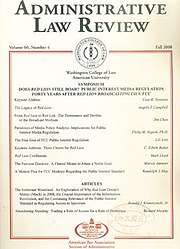Administrative Law Review
The Administrative Law Review was established in 1948 and is the official law journal of the American Bar Association Section of Administrative Law & Regulatory Practice.
 | |
| Discipline | Administrative law, Legal studies |
|---|---|
| Language | English |
| Edited by | Student editors at American University Washington College of Law |
| Publication details | |
| History | 1948–present |
| Publisher | Washington College of Law and American Bar Association Section of Administrative Law & Regulatory Practice (United States) |
| Frequency | Quarterly |
| 0.89 (2017) | |
| Standard abbreviations | |
| Bluebook | Admin. L. Rev. |
| ISO 4 | Adm. Law Rev. |
| Indexing | |
| ISSN | 0001-8368 |
| LCCN | sf82003051 |
| OCLC no. | 01461100 |
| Links | |
Overview
The journal is a quarterly publication that is managed and edited by approximately 80 students at the Washington College of Law. The 2018–2019 Editor-in-Chief is Caroline Raschbaum. The journal has been cited by the United States Court of Appeals for the District of Columbia Circuit[1] (which is known as the administrative law circuit), and since 2000 has been cited by the Second,[2] Fourth,[3] Fifth,[4] Ninth,[5] and Tenth Circuit Courts of Appeal.[6] It was also cited by the Supreme Court of the United States.[7]
Admissions
The Administrative Law Review selects staff members based on a competitive exercise that tests candidates on their editing skills, research skills, legal analysis skills, and legal writing ability. There is not a preset number of accepted candidates each year; recent classes of new editors have ranged from about 45 to 50. The candidate "write-on" exercise is distributed to candidates during their second semester at the law school. An optional "grade-on" process allows students to become staff members based solely on their grades. Transfer students are also eligible for admission through a fall write-on process.
References
- See, e.g., National Mining Ass'n v. Mine Safety and Health Admin., 512 F.3d 696, 700 (D.C. Cir. 2008); Central Texas Telephone Co-op., Inc. v. FCC, 402 F.3d 205, 210-11 (D.C. Cir. 2005).
- Sweet v. Sheahan, 235 F.3d 80, 88 (2d Cir. 2000).
- U.S. v. Duke Energy Corp., 411 F.3d 539, 548 n.6 (4th Cir. 2005).
- Walton v. Rose Mobile Homes LLC, 298 F.3d 470, 490 (5th Cir. 2005).
- U.S. v. Kriesel, 508 F.3d 941, 945 (9th Cir. 2007).
- Dalton v. U.S. Dep't of Labor, 58 Fed. App'x 442, 445 (10th Cir. 2003).
- Immigration and Naturalization Service v. Chadha, 462 U.S. 919, 955 n.19 (1983).